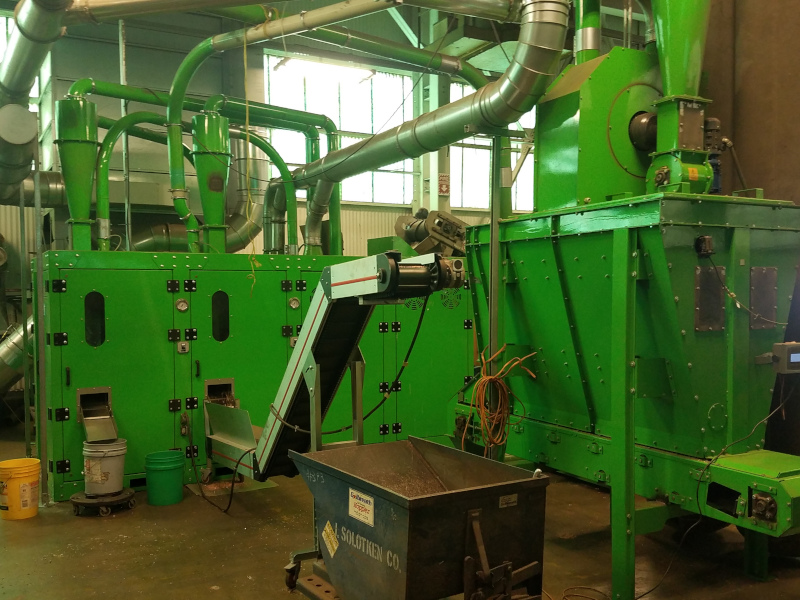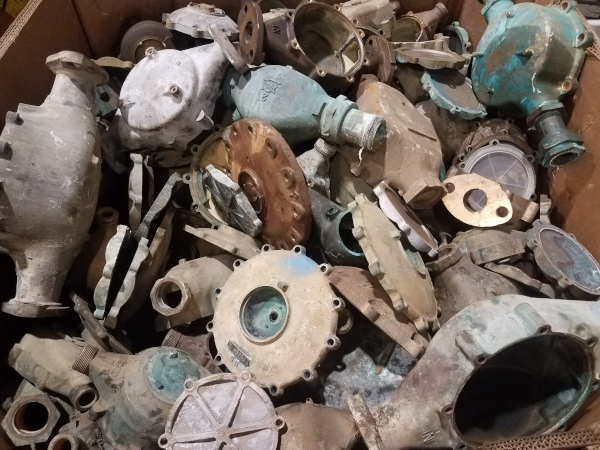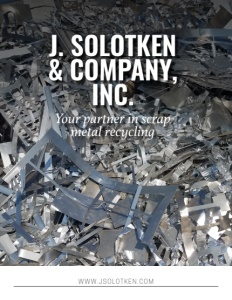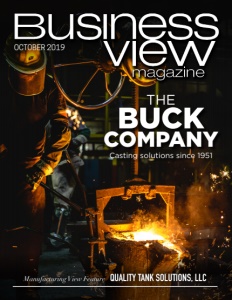J. Solotken & Company, Inc.
Your partner in scrap metal recycling
Business View Magazine interviews representatives from J. Solotken & Company, Inc., as part of our focus on best practices of the metal recycling industry.
J. Solotken & Company, Inc. is an Indianapolis-based scrap metal dealer and broker that processes and recycles industrial and wholesale scrap metal. The 105-year-old, family-owned firm has kept itself relevant and successful for over a century, and across four generations of family leadership, by adapting to new market opportunities and creating lasting partnerships with its buyers and sellers.
The company buys the following metals from its suppliers: copper, aluminum, stainless steel, high temperature alloys, insulated wire, brass, carbide and tool steel, zinc, select steel scrap, and lead. It then processes and recycles those metals, selling the following materials to various entities that either process or consume scrap, including brokers, mills, foundries, and refiners: segregated aluminum, segregated copper, briquetted copper, vacuum quality high-temperature alloys, copper chops, nickel, mill and ingot maker brass, aluminum ingots, segregated tool steel and carbide, segregated stainless steel, and nickel chrome alloys.
J. Solotken has several key suppliers and partners they work with. Among them are their law firm, Taft Stettinius & Hollister LLP, and their accounting firm, Teipen, Selanders, Poynter & Ayres, P.C.

Recently, Business View Magazine spoke with J. Solotken’s long-time President, Joseph Alpert, and its Vice President and Joe’s son-in-law, Brian Nachlis, to find out more about this venerable company. The following is an edited version of that conversation.
BVM: Can you talk a bit about the company’s beginnings and any important milestones over its hundred year history?
Alpert: “The company was formed in 1914, by my maternal grandfather, Jacob Solotken, who was a Russian immigrant who spoke very little English. He started with a horse and wagon collecting rags, paper, rubber – whatever he could obtain that he could sell. We always joked that his horse ate before the family. Metal, of course, was more expensive, and most of the time, he was not able to buy metal.
“As the business grew, he would accumulate scrap in a garage and sell it once a week to have money to operate the following week. One important milestone was when he obtained his first truck, sometime in the 1920s. I was in high school when they bought the first lift-truck in 1956, for the exorbitant sum of $5,600. Another important milestone: my dad, who was my grandfather’s son-in-law, happened to be a Phi Beta Kappa law school graduate, and he practiced law for about two months, but nobody paid him. In 1936, my grandfather invited him to come to the scrap yard for a month or two until his law practice could improve. He ended up staying for 57 years.
“In 1975, my father sold the wastepaper business, which was the largest portion of the business at that time. So, from that time on, we devoted our attention to scrap metal – at that time, primarily non-ferrous metals. As we evolved, we now handle considerable quantities of ferrous, as well as non-ferrous metals.”
Nachlis: “Let me fill in some of the gaps, going back to 1914, when the company was founded. As Joe said, his grandfather didn’t know English; he went to school at night and he operated in a very small, garage-type location. Back in 1936, during the Depression, he was fortunate enough to have built the business to the point where he was able to invest in a larger piece of property, which, because of the Depression, was available. He bought a four-story, brick building of about 160,000 square feet. And that was a huge investment and a huge bet on the success of his company. Of course, Joe’s father had decided to join him in that endeavor, and from the very start, he had visions of the business’s potential.
“In the beginning, Jacob had started going around and picking up rags and rubber and metal. Then he concentrated on being a wholesaler, buying scrap from smaller scrap dealers as J. Solotken became larger. After Joe got involved, and these smaller scrap dealers became more independent, they found that the smaller scrap dealers were not always as loyal to us as they had once been, despite the fact that, at times, our company used to lend money to the smaller scrap companies with the agreement that they would sell scrap back to us. Well, they started selling scrap away from us. Joe saw this as an issue, and from that point on, he concentrated on what we concentrate on to this day, which is industrial scrap – forming business relationships with our manufacturing suppliers. So, no longer are we solely a wholesale and ‘peddler yard.’
“A peddler yard is a scrap yard that caters to the public, where the public can come and sell aluminum cans or sheet iron, or miscellaneous scrap. That is a very, very minor part of our business. We concentrate on forming relationships with manufacturing companies in and around the City of Indianapolis and the State of Indiana. It’s really a service-based industry for us. We have our own fleet of trucks and we provide them container service. We educate them on how to segregate their scrap so that they can attain the highest value for their material. We then send our trucks and containers out to pick up the scrap, exchange full containers for the empties, and then we bring it back to our facility where we process it. We’ve been doing business with some companies for 40 years, just on a handshake and the knowledge that we’re going to treat them right, and they have loyalty to us.
“We stayed in our building from 1936 until 2010. The building was brick construction on the outside, but in the interior, it was all wood – very low ceilings, very narrow aisles, where you had to move the process equipment up and down on freight elevators. Whenever you put anything into stock, or whenever you sold anything, you had to bring it down to the main floor to ship it. So, one of the reasons we decided to move locations was because our old location was totally inefficient for processing scrap, especially metal, in the modern age; we did not have the room for modern equipment; we required a lot of labor to move material; and the efficiencies were just non-existent.
“I joined the company in 1998, after marrying Joe’s older daughter, and after a few years, the investment was made to get out of our old, inefficient property and move into a new property. This new property is 140,000 square feet with 40-foot ceilings. It has very wide aisles, concrete floors, and it’s much more efficient than our old facility, which has allowed us to grow our business, substantially, from where we were in the mid to late ‘90s. I would say we’ve doubled our capacity by moving into this facility and by growing our account base over the past 20 years.”
Alpert: “We handle scrap from many of the largest manufacturing companies within Indianapolis and the bordering counties of Marion County, and this location is extremely friendly for scrap sellers; they can drive inside our building and unload their scrap, which gives us greater flexibility in dealing with the elements.”

BVM: What characteristics would you point to that you believe give your company a competitive advantage?
Alpert: “Having been around so long, we’ve established a number of relationships where even when markets become weak, as they currently are now, we are able, in many cases, to consummate sales, where, maybe, our competitors are less able to do so. Also, as our business has evolved, we’ve become extremely specific in how we can identify various scrap. In many cases, we will identify alloys to .01 percent levels of purity, such as in the brass area, for instance. People want to get away from leaded brasses and move to non-leaded brasses, particularly where the end product is a faucet or something that might be exposed to drinking water. So today, the smelters, and brass and bronze ingot makers, want lead-free brass. Well, we’re able to isolate and really get down to specifics in levels of impurity, which sets us apart from many of our competitors.”
Nachlis: “All consumers only need a certain amount of scrap and we like to think that we produce a quality scrap package, so that when consumers buy from us, they have confidence that the materials that they’ve ordered will be the material that arrives, and that they won’t have any problems with their melt, chemistry-wise, and they can trust the quality of the product. If they can do that, they’ll be more willing to buy material from us than they would from a competitor of ours, or someone that they have not known for 50 or 60 years.
BVM: How do you go to market?
Nachlis: “On the buy side, being around for 105 years, I think we’re well-respected. We have a good reputation, not only in the industry, but in the community. So, a lot of it is word of mouth, and a lot of it is partnerships that our current suppliers have with other manufacturers through outsourcing capabilities. So, if we have a supplier that’s outsourcing some business to another manufacturing company, they will put in a good word for us; we’ll make contact with that manufacturing entity and form a relationship that way.
“On the sell side, we have to be very attuned to changes on the consumer side – new mills that open up, new smelters, new ingot makers. Joe reads a lot of industry publications and he is very skilled at finding new consumers or potential consumers. It comes down to being on top of the marketplace and understanding what’s happening, and who potential consumers are – where they are, what they buy, what they like, what they don’t like; and again, forming relationships with them.”
BVM: What are some of your priorities, going forward?
Alpert: “We have to be flexible and anticipate the needs of our consumers, and work with them, and be responsive to their needs. We have been successful in doing that and it really has helped us to grow our business, substantially.”
Nachlis: “We need to continue to work on efficiencies, and we need to retain our current base of suppliers. There are two ways that our business grows – from our suppliers growing, and by attaining new suppliers. We’ve been very successful at retaining our suppliers, but we’ve also been successful at forming relationships with new manufacturing companies. Five years from now, we will be successful if we have retained the base and have been selective towards new suppliers that we can capture.”
BVM: Any other points that you’d like our readers to know about J. Solotken & Company?
Alpert: “One of the things I learned from my father was that your reputation precedes you wherever you go. So, say we made an offer to buy scrap and the market plummeted (and that just happened, recently, on a purchase of aluminum we made), we honor that commitment. Sometimes it’s difficult, but, in the long run, it pays off. So, I say, all the time, ‘Be very judicious in how you treat people because if you treat them right, it will benefit you; if you treat them wrong, you’ll regret it.’”
Nachlis: “Doing business with us is doing business with a partner. We try to form partnerships; it’s got to be a win/win situation. It’s not just doing business with a company; everybody has contact with us on a first-name basis; they know who they’re dealing with. We don’t have a voice mail system; we don’t have an automated attendant. When you do business with J. Solotken, you’re doing business, almost like, with a member of your family, where you can trust that we are going to treat you the way you should be treated. We have the best interests in mind for our suppliers. If we can add value for our suppliers, it will benefit them, which, in turn, will benefit us.
“Out of the hundreds of suppliers that we have, even in today’s litigious society, we do not require any type of contractual relationship; we don’t enter into contracts with our suppliers where they are obligated to sell us material, say for the next two, or three, or five years. At any time, the relationship that we have with our suppliers can be broken off with one phone call. But despite that, we retain the suppliers that we have, and they continue to do business with us because of the trust between us and because we do try and add value to their business.”
AT A GLANCE
WHO: J. Solotken & Company, Inc.
WHAT: A scrap metal dealer, broker, and recycler
WHERE: Indianapolis, Indiana
WEBSITE: www.jsolotken.com




